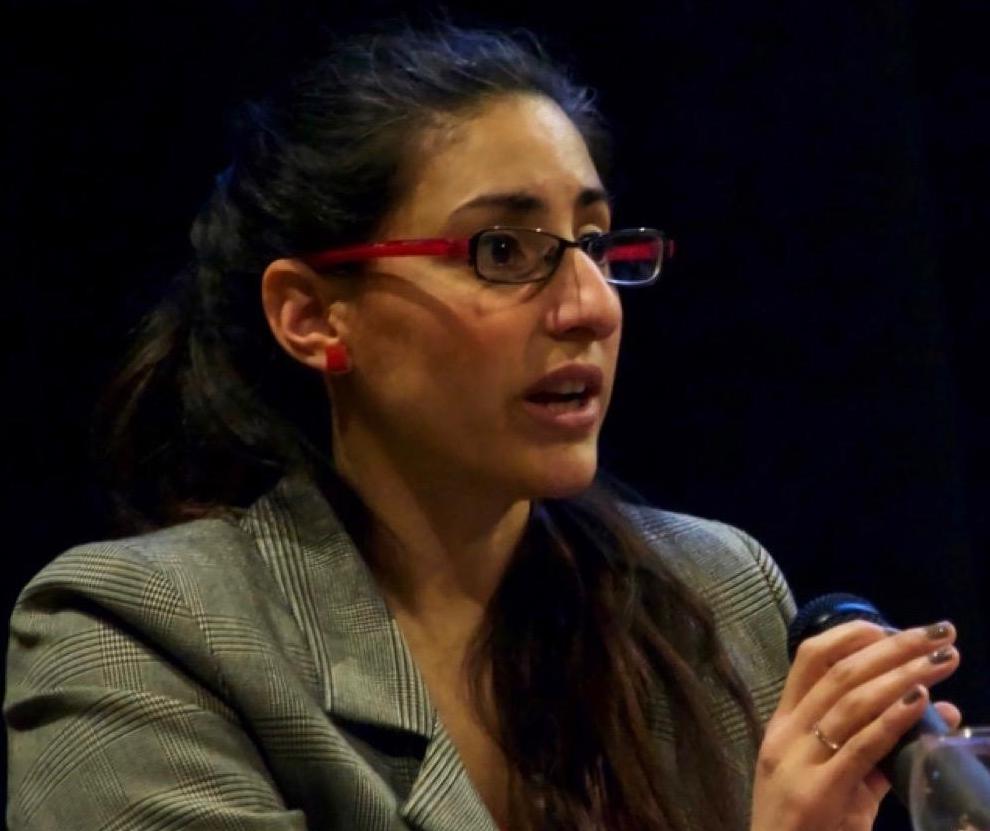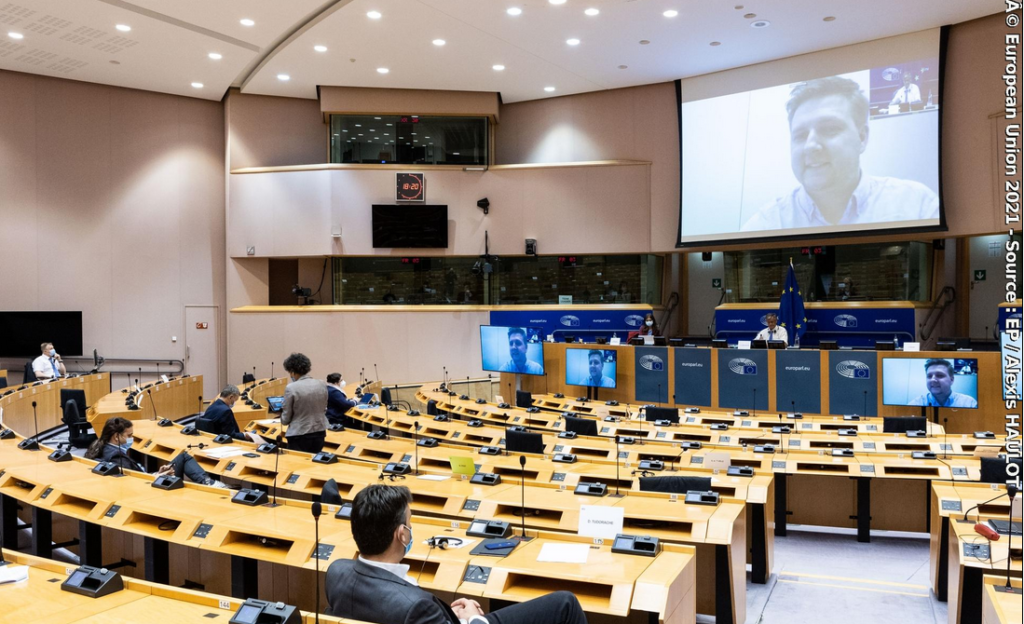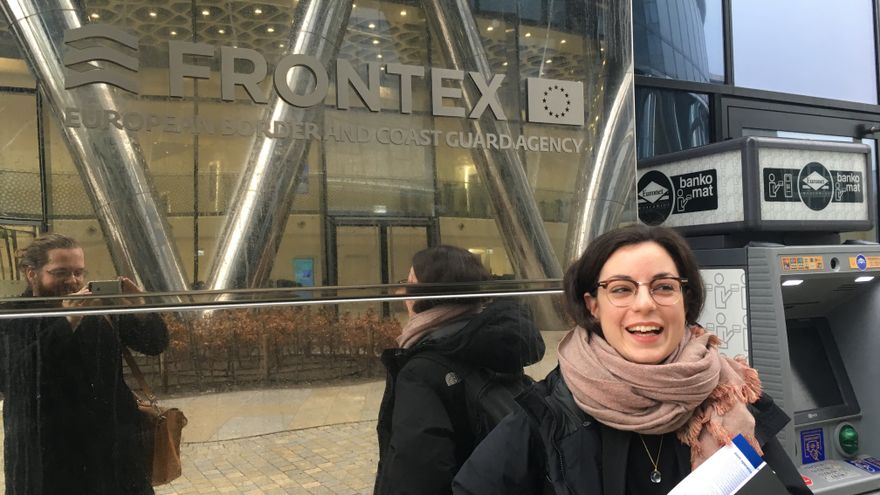Frontex, a large and growing EU agency at the epicentre of the securitisation paradigm, has in recent months become embroiled in a deepening controversy over its alleged lack of transparency and accountability. The current path chosen by Frontex will eventually lead to an institutional crisis, Frontex experts Jane Kilpatrick and Mariana Gkliati argue.

Credit: authors 
Frontex, the EU Border and Coast Guard Agency, is at the epicentre of the securitisation paradigm, and has experienced, since its establishment in 2004, an impressive expansion of its powers and competencies, holding the largest budget amongst all EU agencies, now for the first time counted in billions.
Despite the introduction of a significantly increased mandate, resources and staff base in 2019, safeguarding transparency does not seem to have been prioritised at the same rate. The obstructive and secretive practices of the agency with regard to its activities in general and the access to information requests in particular has been broadly criticised, most recently by the European Parliament, the EU Ombudsman (here and here) and the Meijers Committee.
This reticence extends to the European Parliament, journalists, and civil society, despite the role that these groups are assigned in political and social accountability structures and the broader liberal democratic system of checks and balances. In fact, several practices can be identified that set impediments on oversight, and create all together a dangerous ‘culture of secrecy’.
Openness and transparency as rights
Transparency is an integral element of the fundamental right to good administration (Art 41 EU Charter). Frontex, as an EU Agency, should conduct its work as openly as possible (Arts 15(1),11(2) and 298(1) TFEU), including keeping proper records and providing access to documents to EU nationals and residents (Art. 42 Charter, Art. 15 (3) TFEU, Art. 2 Regulation (EC) No 1049/2001). EU nationals or residents are also entitled to receive an answer when addressing an EU Institution (Articles 20 (2) (d), 24 (4) TFEU).
Art 114 EBCG Regulation also provides that the public shall rapidly be given objective, reliable and easily accessible information with regard to the Agency’s work, while amongst its explicit tasks is to allow for transparency and public scrutiny of its operations ensuring fundamental rights (Art. 10(1)(ad) EBCG Regulation).
Regular proactive and responsive sharing of information with the Commission and the Parliament, to which Frontex is accountable, is an obligation under the agency’s Regulation (Recital 116, Article 6 EBCG Regulation).
Access to Documents requests (Freedom of Information)
Researchers, journalists and activists often rely for their investigations on access to documents requests. These requests are handled since 2016 by a dedicated Transparency Office. Despite the existence of implementing decisions by Frontex’s Management Board to facilitate compliance with Regulation 1046/2001, several gaps and inconsistencies in practical access to documents arrangements have developed.
Frontex often refuses access to documents requests, and more often than not, any released documents are extensively redacted on the ground of public security. Fewer applications receive full access every year, with the full acceptance rate reaching 13.9% in 2017. Out of a total of 108 requests, almost 20% received a full refusal, while 60.2% were only awarded partial access.
Moreover, Frontex has not included in its annual reports for 2018 and 2019 a section on access to documents detailing the number of requests received and their outcome, nor do its annual reports detail the number of sensitive documents held by the agency, failing, thus, to meet its transparency obligations (Art 17 Management Board Decision 2016, Art 17 Regulation 1049/2001).
Furthermore, inconsistencies have been noticed in the agency’s responses to requests. In 2020, similar requests were submitted separately by Statewatch and Mobile Info Team, including the risk analysis preceding the deployment of rapid border intervention teams to Greece in March of that year. Mobile Info Team was granted partial access to five relevant documents with redactions, while Statewatch was denied access to the same documents on the grounds of privacy and public security.
In 2020, a year which saw the agency attempt to recruit 700 border guards, an agency spokesperson confirmed that the Transparency Office “has no budget allocation as it is made up of existing staff and relies on the entire agency to contribute” (Frontex press office spokesperson to Statewatch, 17 June 2021). They later clarified that the Office relies on the part of the budget allocated to the Legal and Procurement Unit.
Frontex legal representatives have responded to the relevant criticism of the EU Ombudsman by claiming to work proactively to help applicants that don’t know the name of a particular document to articulate requests in a way that will enhance the chances of success. However, Statewatch has found that requests for such assistance go unanswered and requests are rejected on these grounds without an attempt to facilitate the request. This also includes instances of falsely claiming that a certain document does not exist. In a separate inquiry, the Ombudsman has explored the Public Access to Documents Office’s automatic use of a queuing mechanism for applicants making multiple requests, finding that such a mechanism “should be applied in exceptional circumstances only”.
Ultimately, documents that are released are accompanied by a disclaimer by the agency that these are released exclusively to the individual that requested them, who is prohibited from sharing those further without prior authorisation.
Blanket refusals to requests outside of the EU
Regulation (EC) 1049/2001 codifies the right of public access to documents for EU citizens or lawful residents, but also grants the option to provide access to individuals residing outside the EU. Frontex chooses not to make use of this possibility, even though it is increasingly active, in some cases with executive powers and the mandate to use force, in non-EU territory (e.g. Albania).
In such cases, it is almost exclusively non-EU citizens or residents who can be affected by Frontex’s actions. Yet those seeking information about such work are denied the same right to request access to documents on the agency’s work that an EU citizen can use.
Frontex claims to have
“hardly received any such requests from third countries (on average, one such request annually). In these cases, Frontex analyses the merits of all public access to document applications…” (Frontex press office spokesperson to Statewatch, 17 June 2021)
However, according to our observations, this statement does not match the experience of those who have made such requests. Identical requests made by one organisation based in France, and one based in Senegal, have received different responses; access was denied to the Senegalese organisation, while redacted copies of the documents were shared with the Paris-based Migreurop. The examples are circumstantial but representative. Unfortunately, the lack of more stable statistical data by the agency regarding requests for access to documents from outside the EU’s borders precisely showcases the impediments on transparency.
Judicial Challenge
The decision of the Agency for total or partial refusal of access is reviewable by the CJEU, as it is an act of direct effect of the agency. Individuals may bring an action for annulment under Article 230 TFEU pursuant to Article 8 of Regulation (EC) No 1049/2001.
The one case where such challenge has been attempted was not successful for the applicants. Following the judgment of the General Court, the agency claimed back legal costs amounting to €23,700. The demand, especially regarding the amount of the claim was perceived as an active effort of intimidation and discouragement of further transparency actions against the agency. As a matter of fact, the CJEU ruled that the amount was unjustifiably excessive and reduced it to less than half (€10,520).
Privileged access to information
According to its Regulation, Frontex answers to its Management Board, but is also accountable to the European Parliament (Art. 6 EBCG Regulation), which is the most important forum of political accountability for EU institutions. The agency needs to keep a proactive and open stance towards it. The role of the European Parliament was also enhanced in the 2019 EBCG Regulation. However, this stronger role on paper does not always translate in cooperation for effective oversight.
In February 2020 a Frontex Scrutiny Group was established by the LIBE Committee to investigate allegations of the agency’s involvement in pushbacks.
In the first session of the Frontex Scrutiny Group in February 2021, the Frontex Executive Director, Fabrice Leggeri stated:
“I am personally committed to cooperating with the Scrutiny Group. You will be granted access to the documents that you need and I offer the possibility for the members of the Scrutiny Group to visit the headquarters”.
FSWG Chair Roberta Metsola acknowledged in the group’s final hearing that there had been delays in receiving documents from Frontex, which were sent by encrypted USB and had strict access rules. These rules would mean that only the group members and direct advisors could review the numerous documents ahead of the reporting deadline.
Towards more openness and transparency
In the 2019 Regulation, the role of Frontex Fundamental Rights Officer and the Individual Complaints Mechanism were boosted, an update that was expected to have led to increased openness and transparency in line with the Agency’s expanded mandate. The recent report of the Frontex Scrutiny Working Group demonstrates that this has not been the case. In fact, the Scrutiny Group found serious gaps regarding the Agency’s obligations on access to information and transparency. Regarding the prohibition for further sharing of disclosed documents, the Scrutiny Group noted that ’the Agency as an EU institution does not fall under the law on intellectual property’, and therefore cannot impose such copyright on recipients. The Frontex Management Board working group, FRaLO, created to respond to allegations of pushbacks in 2020 recognised that the attempt to discourafe dissemination befits “a too restricted classification regime [that] reduces transparency”. Statewatch and other organisation systematically publish documents released through access to documents requests; Frontex has not to date taken any legal action in this regard.

During the FSWG hearings, the Chair of the Frontex Management Board appealed for more transparency for material regarding the serious incidents studied by FRaLO. The need for the agency to enhance transparency in its work was also stressed by legal experts, the representative of the Fundamental Rights Agency, and the NGOs Refugee Support Aegean and Hungarian Helsinki Committee, during the Frontex Scrutiny Group hearings. Frontex has space to improve its record in terms of honouring the right of access to documents, and further opening a window to its assessment of the internal human-rights related Serious Incidents Reports and the justification of the decision of the Executive Director to continue an operation.
Conclusion
Unchecked refusal of access to documents on the grounds of public security, the rate of redaction within documents, the inconsistent granting of access to different applicants, limited cooperation with the European Parliament, and the use of this justification for information already public, demonstrate serious gaps in transparency. Similarly, blanket refusals to requests outside the EU, significantly impedes efforts to bridge the gap between public information about Frontex’s activities in non-EU states, and their day-to-day reality. By examining Frontex’s increasing resistance to share information, a systematic practice of obstruction and secrecy becomes clear. While its Executive Director and press office profess a commitment to transparency, regular publications of information on documents have ceased, while access itself has decreased, and the risks to individuals challenging refusals have been firmly established.
This systemic aversion to disclose information to the public and the Parliament can impact on freedom of information and on fundamental rights more broadly. By obfuscating details of, for example, operational plans, agreements with non-EU states, or serious incident reports, the Agency can maintain control of how its day to day activities are understood. In a complex international context, where many actors have influence, this can result in gaps in accountability and impact the enforcement of basic fundamental rights of EU citizens and migrants. This road eventually leads to an institutional crisis. The mistrust in the Agency to respect fundamental rights during joint operations was far from eased by the various inquiries , held as a result of investigations in 2020. However, Frontex continues to insist in its public messaging that it has been absolved of any wrongdoing, while preventing access to unbiased information at the same time. If there is no trust in adequate oversight and accountability, core democratic priorities are undermined. Therefore, independent external monitoring of an agency such as Frontex is necessary for its proper functioning, protecting fundamental rights, and ensuring a genuine commitment to transparency.
Jane Kilpatrick is a researcher at Statewatch, based in the United Kingdom. Mariana Gkliati is an assistant professor of international and European law at Radboud University, the Netherlands.

This article is based on the Statewatch analysis “Frontex, secrecy and story-telling: control of information as super-strategy” (July 2021) by Jane Kilpatrick, and a forthcoming article “Crying wolf too many times: the role of Frontex in transparency and the normalisation of the securitisation paradigm” by Mariana Gkliati and Jane Kilpatrick. The Statewatch article was the third instalment of a series examining some under-reported and under-examined issues concerning Frontex. The first two parts of the series, looking at the history and evolution of the agency’s search and rescue obligations, can be found here and here.





One reply on “Frontex, secrecy and security: control of information as strategy for institutional preservation”
[…] Eine überwältigende Mehrheit des Europäischen Parlaments entschied, 90 Millionen Euro (12%) des Frontex-Budgets für 2022 einzufrieren. Frontex solle zuerst Verbesserungen in Bezug auf die Grundrechte und die Kontrolle der Finanz-, Einstellungs- und Vergabeverfahren gewährleisten.Die Abgeordneten fordern unter anderem die Einstellung von 20 fehlenden Grundrechtsbeobachter*innen und drei stellvertretenden Exekutivdirektor*innen, die ausreichend qualifiziert sind, um diese Positionen zu besetzen. Ausserdem fordern sie die Einführung eines Mechanismus zur Meldung schwerwiegender Vorfälle an den EU-Aussengrenzen sowie ein funktionierendes Grundrechtsüberwachungssystem. U.a. hat die Klage einer syrischen Familie die Debatte an diesen Punkt gebracht. Die Familie mit vier kleinen Kindern beantragte Asyl in Griechenland. Elf Tage später schob Frontex die Familie per Flugzeug in die Türkei ab, ohne ihnen Zugang zum Asylverfahren gewährt zu haben. Dabei wurden die Kinder sogar in Anwesenheit von Frontex von ihren Eltern getrennt. In der Türkei wurde die Familie sofort inhaftiert.Nur ein sehr kleiner Teil der Gewalterfahrungen von Migrant*innen durch Frontex ist derzeit Gegenstand der mehr als zehn laufenden Untersuchungen gegen Frontex. Diese und alle anderen Situationen von Entrechtungen durch Frontex zeigen, dass Frontex weggespart und abgeschafft gehört.https://www.eu-opengovernment.eu/?p=2917https://www.statewatch.org/observatories/frontex/frontex-under-scrutiny-inquiries-and-investigations-november-2020-onwards/full-text-of-the-european-parliament-scrutiny-group-report-on-fundamental-rights-violations/ […]